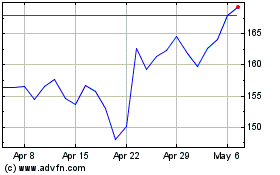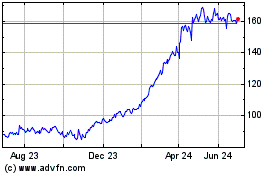By Ryan Tracy and Ted Mann
WASHINGTON -- U.S. regulators rescinded stricter oversight of
General Electric Co.'s finance arm, GE Capital, after saying the
company had made changes that significantly reduced its threat to
U.S. financial stability.
The U.S. Financial Stability Oversight Council said it had voted
this week to remove the company's "systemically important" tag.
Treasury Secretary Jacob Lew said the change shows that designation
is a "two-way process."
The head of GE Capital, Keith Sherin, said the decision is a
result of the transformation of GE Capital into a "smaller, safer
financial services company."
Since deciding to wind down its finance arm, GE Capital has
signed agreements for the sale of about $180 billion of businesses
and has closed about $156 billion of those transactions.
General Electric may now be able to add more debt to its balance
sheet as Nelson Peltz's Trian Fund called for when the activist
investor took a $2.5 billion stake in the conglomerate last year.
Executives have been waiting to get out from under Fed oversight to
explore such moves.
"We very may well decide to add additional leverage to the
company, and we talked about something like $20 billion of
potential capacity over time, which gives us a lot more flexibility
around how we think about M&A as well," CFO Jeff Bornstein said
last week.
The case marks the first time the Financial Stability Oversight
Council has removed the "systemically important" tag since it was
created under the 2010 Dodd-Frank financial overhaul law. GE had
been seeking removal of the label, which it received in 2013 and
comes with stricter oversight, for more than a year. The company
has reduced the size of the finance business by more than half and
cut reliance on volatile forms of short-term funding, among other
concerns regulators had raised.
For the oversight council, the change is a significant response
to critics who have said its process for tagging "systemic" firms
is opaque and doesn't give firms a clear road map on how to reduce
risk.
"The Council follows the facts: When it identifies a company
that could threaten financial stability, it acts; when those risks
change, the Council also acts," Mr. Lew said.
He said the council conducted a "methodological analysis" of GE
Capital and determined it is "significantly smaller and safer, with
more stable funding."
GE formally asked for the label to be removed in March, and met
with the council staff during April and May, the Treasury
Department said.
The decision comes as FSOC -- a committee made up of 10
regulatory agencies -- is caught in the middle of both legal and
political battles challenging its authority.
On the legal front, FSOC is appealing a federal judge ruling
nullifying its authority to impose the "systemically important"
label on MetLife Inc. The stakes are seen as so high that the
government case has drawn supporting briefs from an all-star cast
of financial crisis-era policy makers, including former Federal
Reserve Chairs Ben Bernanke and Paul Volcker, and former lawmakers
Chris Dodd and Barney Frank, the co-authors of the 2010 Dodd-Frank
Act that created FSOC.
Meantime, Republicans in Congress are moving legislation that
would replace Dodd-Frank, including provisions that would scale
back FSOC's authority to designate firms as SIFIs.
GE announced almost one year ago, in April 2015, that it would
pivot away from financial services and sell off most of GE Capital,
what was then its $500 billion lending business and one of the
largest banking businesses in the U.S.
Chief Executive Jeff Immelt said changed market conditions and
new regulations had caused GE Capital's returns to fall below its
cost of capital. And investors had long urged Mr. Immelt to get out
of the lending business, which nearly sunk the entire company
during the financial crisis.
GE has narrowed its focus to high-tech industrial products like
jet engines, power turbines, locomotives and medical scanners. That
has meant jettisoning the lending businesses to buyers from the
U.S. and elsewhere. GE unloaded more than $30 billion in real
estate, including office buildings and hunks of debt, to Blackstone
Group and Wells Fargo & Co. The company also sold its North
American commercial lending business, which had about $30 blliion
in assets, to Wells Fargo last fall.
GE will continue to operate its aircraft and jet engine
financing operation, as well as a unit that invests in energy and
power projects, and a smaller unit that provides health
care-related financing. Overall, the share of GE's profits from
lending will drop substantially, however, from about half in the
middle of the last decade, to less than 10% of total earnings by
2017, the company says.
Wednesday's announcement leaves two nonbank firms with the
systemically important label, as opposed to four just a few months
ago. Huge insurers Prudential Financial Inc. and American
International Group Inc. also received the label in 2013 are still
considered systemically important, meaning they are overseen by the
Fed and face stricter rules than their peers.
MetLife Inc. was designated in late 2014, but its court victory
nullified that status, pending the government's appeal.
GE Capital's success at rescinding the label by appealing
directly to the oversight council could lead Prudential or AIG to
follow a similar path. The council is required to review the labels
annually under Dodd-Frank.
Separately, some investors are pressuring some of the SIFIs --
both banks and non-banks -- to follow GE's strategy of shedding
assets and shrinking to persuade they government they don't pose a
threat to financial system.
Write to Ryan Tracy at ryan.tracy@wsj.com and Ted Mann at
ted.mann@wsj.com
(END) Dow Jones Newswires
June 29, 2016 10:24 ET (14:24 GMT)
Copyright (c) 2016 Dow Jones & Company, Inc.
GE Aerospace (NYSE:GE)
Historical Stock Chart
From Mar 2024 to Apr 2024

GE Aerospace (NYSE:GE)
Historical Stock Chart
From Apr 2023 to Apr 2024
